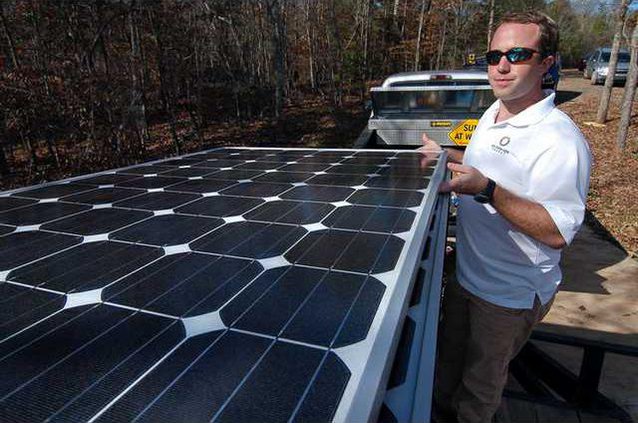Database of State Incentives for Renewables and Efficiency: More information about Georgia’s tax credits for green power.
Imagine, on a sunny fall afternoon, being able to open your home’s windows and doors, enjoy a warm breeze — and make money while doing it.
That’s the benefit of installing a system of solar panels on your roof to generate electricity for your home, with any extra getting sent back out to the power grid. And while solar panels are expensive, federal and state tax breaks help make it so the system pays for itself in just a few years, thanks to the savings in electricity costs.
So far just one Hall County resident has installed a solar energy system, according to Justin Green, co-owner of Southern View Energy. His company has installed lots of water heating systems, but the main difference between a solar water heater and solar panels is in the electricity the panels generate for the entire house.
“March and April they probably won’t use as much heating and air and cooling and whatnot, so it very well could provide 100 percent of (the home’s) electricity,” said Green last week as he and a few representatives from Jackson EMC worked to install a solar panel system in a North Hall home.
Southern View Energy installed 36 solar panels on the home’s south-facing roof.
“We sized it to offset as much as they can, given the square footage and area of the roof,” he added. “So, some months they might (only use solar power) and January, February, they probably won’t because of the demand they’ll have heating their house. Every day will be different; the sun will shine better one day than another.”
But just because it’s a cloudy day, Green said you shouldn’t discount the sun’s power. Even with cloud cover, solar panels are collecting energy from the sun.
The electricity produced by the panels are a direct current energy, he said. This means the electricity can flow in just one direction — and it does, straight to an inverter on the side of the house that converts the solar-generated power to alternating current power.
Once converted to AC power, the electricity can run in multiple directions, allowing it to flow within the home or be sent back out to the power grid.
Homeowners who install solar panels then offset their own energy uses — but the electricity running to the home is never cut off.
According to Jackson EMC, which also has a rebate program for homeowners who install solar panels, the solar energy can offset the overall usage or any extra can be sent out over the power grid and bought back by the power company at a rate that’s similar to a wholesale electricity rate.
In the nine-county area that Jackson EMC serves — and 182,000 customers — there are just two solar-powered homes.
Then, there’s the tax rebates available to green energy items like solar panels.
Federal tax credits are available, at 30 percent of the cost with no upper limit, through 2016 for homeowners who install geothermal heat pumps, solar water heaters, small wind energy systems, fuel cells and solar panels. Georgia also offers tax savings for solar installation, and both Jackson EMC and Georgia Power offer solar buyback programs, which means they have a set rate they will pay for unused solar electricity that goes back to the grid.
And as an added bonus, businesses get an even bigger tax credit for installing solar panels. For more information about green energy-related tax credits, visit www.dsireusa.org.
“The biggest barrier of entry is cost, to anything,” said Green, comparing recent sales in the solar industry to the jump in new car sales after the recent Cars for Clunkers tax credit. “Same thing here. We’ve got a ton more interest than in years past, and the industry is growing because of it.”

